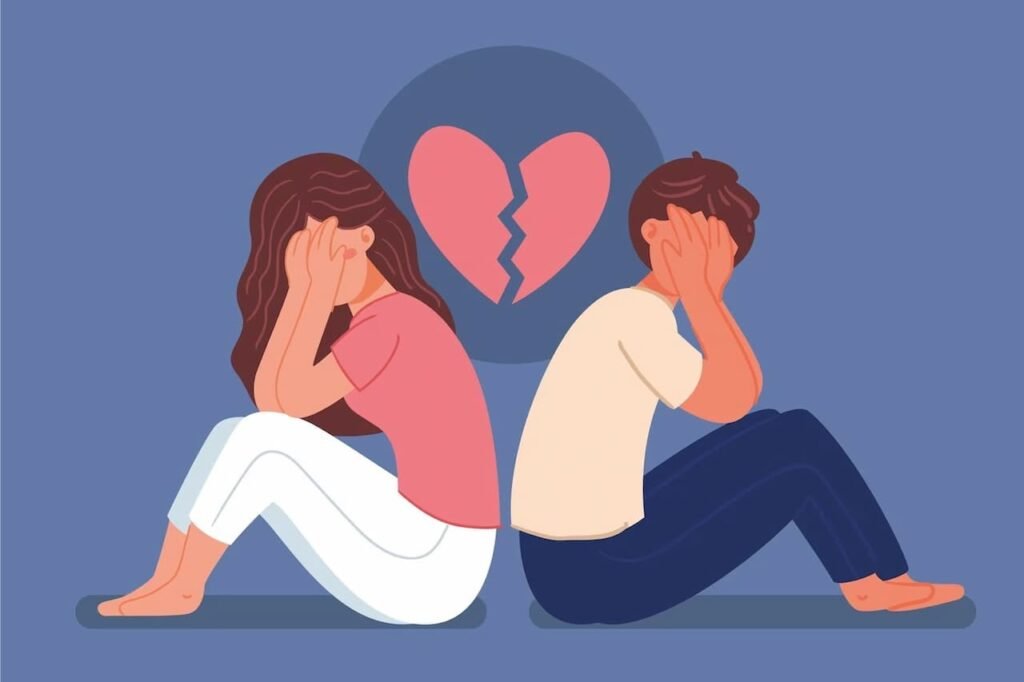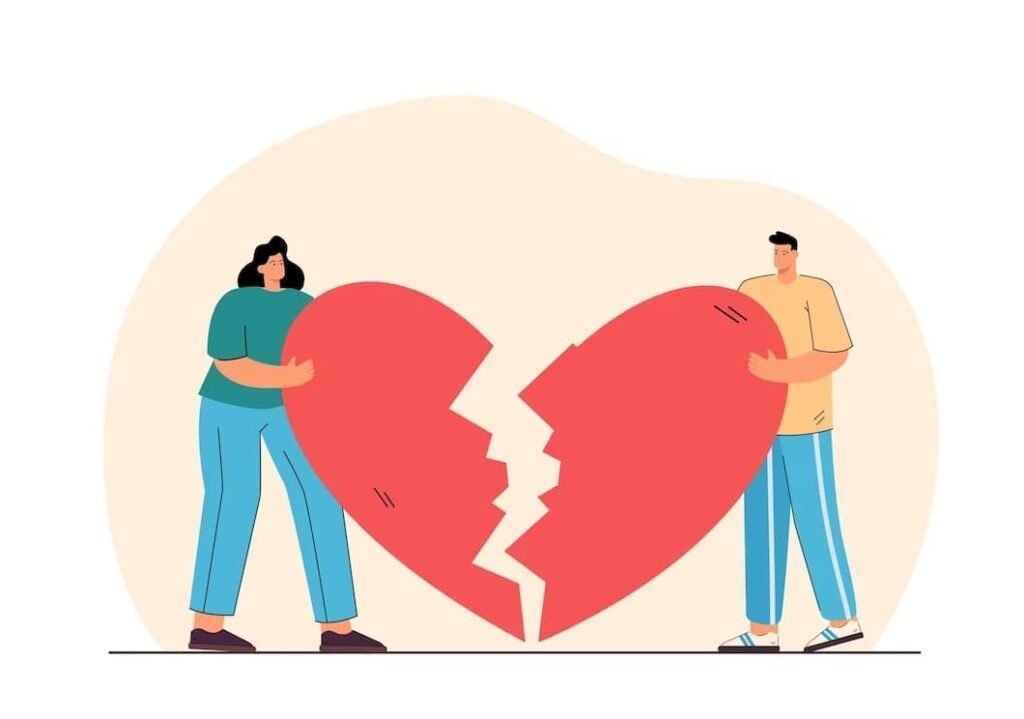Top Breakup Counselling Psychologists Near Me Find expert therapists nearby who can help you with breakup counseling and emotional support.
Breaking up can be a painful and emotionally challenging experience, whether it was initiated by you or your partner. The process of letting go of a relationship can be a difficult and lonely journey, and many individuals struggle to come to terms with the end of a significant relationship.
Table of Contents
ToggleOne of the most difficult and emotionally taxing events in life might be going through a breakup. You might experience extreme sadness, grief, rage, perplexity, and loneliness during this time. We are aware of how challenging it may be to move on after a breakup and how crucial it is to have a listening ear. We provide specialised breakup counselling services to aid you in navigating this trying time.
What is a Breakup?
A breakup is when the relationship between two people ends. It usually involves one or both partners making the decision to end the relationship, frequently as a result of irreconcilable differences, a loss of feelings, or other problems that make it difficult to keep the relationship going. Both sides can suffer pain and emotion during a breakup, since these emotions frequently include sadness, anger, and grief. However, it might also be a necessary step for people to move on and find pleasure in their life.

What Causes Breakup in Relationship?
A romantic relationship may end for a variety of reasons. Communication issues, infidelity, contrasting values or opinions, growing apart, a lack of trust, unresolved disagreements, and outside pressures are some of the common reasons for a breakup. The inability of partners to connect and be content in a relationship due to fundamental differences in lifestyle, values, personality, or communication styles is another frequent cause of divorce. In the end, the persons involved and the particular dynamics of their relationship will determine the precise causes of a split. Some common reasons include:
Incompatibility
Incompatibility is a common reason for breakups in romantic relationships. When two people are incompatible, it means they have fundamental differences that make it difficult for them to be happy and fulfilled in the relationship. This can manifest in various ways, such as:
- Differences in lifestyle: It may be challenging for partners to connect and enjoy each other’s company if they both have different interests, pastimes, or ways of passing the time.
- Differences in values and beliefs: Couples that disagree on issues like politics, religion, or morality may find it difficult to communicate and comprehend one another.
- Differences in personality: Conflict can arise in a relationship if the partners have opposing personality traits, such as one being introverted and the other being extroverted.
- Differences in communication style: When partners communicate in different ways, such as one being more direct and the other more oblique, it can cause misunderstandings and irritation.
When these differences are significant enough, it can lead to feelings of dissatisfaction, frustration, and a sense that the relationship is not working out. Incompatibility can be a difficult issue to overcome, and in some cases, the best course of action may be to end the relationship and seek out more compatible partners.

Regular Arguements
Regular arguments can be a significant source of stress and tension in a relationship, and can ultimately lead to a breakup if they are not resolved. Some common reasons why partners may argue frequently include:
- Communication problems: When couples are unable to effectively communicate, misunderstandings and misinterpretations can happen, which can result in conflicts.
Differences in opinion: Partners may hold opposing views on particular topics, resulting in conflicts and arguments. - Resentment: A healthy and happy relationship can be challenging to sustain when there are unresolved problems or disagreements between couples.
- Control issues: Conflict and disputes can arise if one partner tries to dominate or control the other.
Frequent arguments can be a sign of deeper issues in the relationship, and it’s important for partners to work together to resolve these issues in a healthy and constructive way. If arguments persist and are not resolved, it may be a sign that the relationship is not working out and a breakup may be necessary.
Misunderstanding between couples
Couples’ misunderstandings can be a major source of tension and conflict in a relationship, and if they are not handled, they may even cause it to end. Couples’ misinterpretations of each other’s words, deeds, or intentions can lead to misunderstandings, which can be fostered by a number of reasons, including:
- Assumptions and expectations: Different expectations or assumptions between partners about the union or each other might cause misunderstandings and disappointment.
- Differences in background or culture: Partners from various origins or cultures may view particular events or communicate in different ways, which can cause misunderstandings.
- Lack of empathy or understanding: Partners who do not try to comprehend one other’s viewpoints or emotions may be more prone to miscommunications.
- Insecurity or jealousy: Couples that are insecure or envious of one another may misread one other’s behaviour or intentions, which can result in misunderstandings.
Partners must cooperate in order to recognise and handle differences in a constructive manner. This might involve speaking with understanding and empathy, stating assumptions and expectations, and practising active listening. If misunderstandings persist and cannot be resolved, it can be a sign that the relationship is failing and a breakup is necessary.
Affairs with other person
A partner having an affair-having a romantic or sexual contact with someone outside the relationship-is one of the most frequent causes of a breakup. Affair-related behaviours can happen for a number of reasons, including a need for novelty or excitement, a lack of fulfilment or happiness in the current relationship, or a lack of dedication or loyalty to the relationship. Affairs can be disastrous for the betrayed partner, leading to hurt, resentment, and feelings of betrayal. They can also erode the trust and closeness that are crucial to a good partnership.
While some couples may be able to move past infidelity with the aid of counselling and a dedication to restoring trust, other couples may discover that the betrayal is too deep and that a breakup is required to move on and find healing.

Change in feelings
A change in feelings, where one or both partners no longer feel the same way about one other as they did at the beginning of the relationship, is another typical reason for a breakup. This may take place for a number of reasons, including a loss of emotional or physical chemistry, a divergence in priorities or interests, or even a simple breakdown in love. A good and satisfying relationship can be challenging to maintain when feelings shift, and parties may experience disconnection or unhappiness.
While some couples might be able to overcome a shift in feelings by going to counselling or renewing their commitment, other couples might discover that a breakup is required to move on and find happiness somewhere else. Even though a breakup is unavoidable, it’s crucial for partners to express their sentiments to one another honestly and openly while also showing respect and care.
Family Problems
Family problems can cause tension and disagreement inside the partnership, which can also lead to a split. Family-related problems that frequently end in divorce include the following:
- Disapproval or interference from family members: Relationship tension and anger may develop if one partner’s family dislikes to the marriage or tries to interfere.
- Differences in family values or beliefs: Relationship pressure can result from partners’ differing family-related attitudes or views, such as parenting approaches or traditions.
- Financial issues related to family: Relationships may become stressful and strained if couples must make financial contributions to their families, such as helping out ageing parents or siblings.
- Unresolved family conflicts or trauma: Unresolved issues or trauma from their backgrounds may affect a couple’s capacity to communicate and preserve a healthy relationship.
Although dealing with family issues can be challenging, it is important for partners to communicate their anxieties in an open and polite manner and work together to find solutions that satisfy their shared needs and goals. If family-related issues cannot be resolved or are causing a lot of stress or strain, it may be necessary to consider a breakup in order to gain greater stability and contentment.
Lack of interest
Lack of interest may be a sign that one or both spouses no longer care about the union, which is another common cause of divorce. Numerous factors, such as a loss of an emotional or physical connection, a difference in goals or interests, or even a straightforward split, might contribute to this lack of interest. When one spouse loses interest, it can be difficult to reconcile a feeling of isolation and alienation.
While some couples may be able to reignite their passion through counselling or by making a sincere effort to reconnect, others may realise that a breakup is necessary to move on and find happiness elsewhere. In order to find solutions that satisfy their needs and common goals, couples should be open and honest with each other about how they feel. Lack of interest could be a sign that the relationship isn’t working out and that, if it persists, a breakup might be required.

Sexual incompatibility
Sexual incompatibility is a frequent cause of separation since it can lead to stress, irritation, and dissatisfaction in the relationship. Finding common ground and developing a successful sexual relationship can be challenging when partners have diverse sexual demands or interests. Differences in libido, preferences for certain sexual activities, or problems with physical intimacy are a few frequent problems associated with sexual incompatibility. Sexual incompatibility can cause partners to feel dissatisfied or unfulfilled in their relationships, which can breed anger and annoyance.
While some couples may be able to overcome their sexual incompatibilities by going to therapy or trying out new methods of intimacy, other couples could discover that a breakup is required in order to achieve greater fulfilment and happiness elsewhere. In order to develop solutions that meet both partners’ wants and goals, it is crucial for partners to communicate frankly and respectfully about their sexual needs and preferences. A breakup may be essential if sexual incompatibility cannot be overcome as a symptom that the relationship is not working out.

Ways to deal with a Breakup
Dealing with a breakup can be difficult and painful, but there are some ways to help you move on and heal. Here are some suggestions:
- Allow yourself to feel your emotions: After a breakup, it’s common to experience sadness, rage, or hurt. Allow yourself to experience these feelings, and allow yourself to cry if necessary.
- Lean on your support system: Ask your relatives and friends for assistance. They might be consoling and aid in your emotional processing.
- Take care of yourself: Concentrate on taking care of yourself, which can involve healthy diet, exercise, and adequate relaxation. Spend some time doing enjoyable things, like reading a book or having a nice bath.
- Avoid contact with your ex: Giving oneself time and space to heal is crucial. Stay away from your ex and attempt to stay away from situations where you might run into them.
- Keep yourself busy: You can help yourself avoid pain by keeping yourself busy. Spend more time with friends or explore new interests.
- Seek professional help: Think about getting support from a therapist or counsellor if you’re having problems managing. They can give you resources and techniques to manage your emotions.
Keep in mind that everyone’s journey to healing is unique and takes time. Be kind to yourself and concentrate on taking each day as it comes.

Counselling for Relationship Breakup
How breakup counselling sessions help you?
- Recognise and deal with your feelings of despair, rage, guilt, and worry.
- Recognise any unfavourable thought and behaviour patterns that can be causing your distress.
- Create coping mechanisms to control your emotions and lessen stress.
- Raise your sense of worth and self-worth.
- Create a plan to advance in a wholesome and constructive manner by setting realistic goals.
- To strengthen your current and future connections, work on your communication and interpersonal abilities.
Although scheduling an appointment with one of our therapists might be a challenging decision, we urge you to do so in order to take the first step towards healing. You can access our handy and adaptable online counselling sessions from the convenience of your home.

How Medavas help in Breakup Counselling
Our staff of licenced therapists has years of experience in assisting people in getting over breakups and moving on in a healthy way. To help you get through your breakup, we offer a safe space where you may express your feelings, discuss your thoughts, and receive assistance.
Our breakup counselling sessions are geared to your particular requirements, and together, we create a specialised treatment strategy that takes into account your particular circumstance. We provide several different types of therapy, such as Cognitive-Behavioral Therapy, Mindfulness-based Therapy, and Psychodynamic Therapy, among others.
To help you get through this trying time, our team of experienced counsellors is here to offer support and direction. Because we are aware that each person’s circumstances are special, we provide a variety of counselling services that are specialised to match your needs.
Our services include:
- One-on-One Counselling: Our one-on-one therapy sessions offer a secure and encouraging setting where you may examine your emotions, acquire understanding of them, and discover coping mechanisms to aid in your future.
- Group Therapy: You can connect with people who are going through a similar experience during our group therapy sessions. You may feel more at ease and supported if you express your feelings to people who can relate to what you’re going through.
- Online Counselling: For those who would rather receive counselling in the comfort of their own home, our online counselling service offers a practical and adaptable choice.
- Breakup Counselling: We offer breakup counselling to assist you get over the difficulties of a breakup if it is affecting your present or future relationships.
To arrange a consultation and take the first step towards recovery and a healthy future, please call or email us right away.
Frequently Asked Questions (FAQs) for Breakup Counselling
What is Breakup Counselling?
Therapy called “breakup counselling” aids those who are coping with the fallout from a breakup. Our counsellors assist clients in processing their emotions, spotting patterns in their interpersonal interactions, and creating healthy coping strategies.
How do I know if I need breakup counselling?
Breakup counselling might be a good choice for you if you’re finding it difficult to deal with the end of a relationship. Feeling stuck in your sorrow, finding it difficult to move on, feeling nervous or sad, or experiencing changes in your appetite or sleep patterns are some typical indicators that you might benefit from counselling.
How long does breakup counselling last?
The duration of your breakup counselling session will depend on your unique needs and situation. While some patients may benefit from longer-term treatment to address more serious emotional scars, others may only require a few sessions to work through their emotions.
Is breakup counselling confidential?
Yes, we place a high value on your privacy and confidentiality. Due to professional norms of ethics, our counsellors are prohibited from discussing any details of your sessions without your express permission.
Can counselling help get my ex back?
Counselling can provide support and assistance for individuals going through a breakup, but it’s crucial to remember that there are no guarantees of getting an ex back. Instead of just attempting to restart the relationship, the emphasis should be placed on personal development and healing.
Is it ok to miss someone after a breakup?
After a breakup, it is very common to miss someone. Breakups can be challenging and lead to a variety of feelings, such as sadness, loneliness, and yearning for the partner you were with. After a breakup, missing someone is a normal part of the mourning process, so it’s crucial to give yourself permission to feel those emotions and give yourself the time you need to recover. It’s crucial to keep in mind that everyone’s journey to recovery is unique and takes time.
Where can I find the best breakup counsellors?
Nowadays, you can find the best breakup therapists online at sites like Medavas.com, which provides a counselling setting that is 100 percent safe, private, and staffed by therapists who have undergone thorough training and certification.




